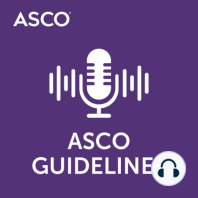27 min listen

Management of the Axilla in Early-Stage Breast Cancer: OH (CCO) and ASCO Guideline
FromASCO Guidelines
Management of the Axilla in Early-Stage Breast Cancer: OH (CCO) and ASCO Guideline
FromASCO Guidelines
ratings:
Length:
13 minutes
Released:
Jul 19, 2021
Format:
Podcast episode
Description
An interview with Dr. Muriel Brackstone from London Health Sciences Centre and Dr. Tari King from Dana Farber and Brigham and Women’s Cancer Center, authors on “Management of the Axilla in Early-Stage Breast Cancer: OH (CCO) and ASCO Guideline.” This guideline addresses management & timing of surgical and radiotherapeutic treatment of the axilla in early breast cancer. Read the guideline at asco.org/breast-cancer-guidelines. Suggest a topic for guideline development at surveymonkey.com/r/ascoguidelinesurvey. TRANSCRIPT [MUSIC PLAYING] SPEAKER: The purpose of this podcast is to educate and to inform. This is not a substitute for professional medical care, and is not intended for use in the diagnosis or treatment of individual conditions. Guests on this podcast express their own opinions, experience, and conclusions. The mention of any product, service, organization, activity, or therapy should not be construed as an ASCO endorsement. [MUSIC PLAYING] BRITTANY HARVEY: Hello, and welcome to the ASCO Guidelines podcast series, brought to you by the ASCO Podcast Network, a collection of nine programs covering a range of educational and scientific content and offering enriching insight into the world of cancer care. You can find all the shows, including this one, at podcast.asco.org. My name is Brittany Harvey, and today I am interviewing Dr. Muriel Brackstone from London Health Sciences Center in London, Ontario and Dr. Tari King from Dana-Farber and Brigham and Women's Cancer Center in Boston, Massachusetts, authors on "Management of the Axilla in Early-Stage Breast Cancer" Ontario Health (Cancer Care Ontario) and American Society of Clinical Oncology Guideline." Thank you for being here Dr. Brackstone and Dr. King. DR. MURIEL BRACKSTONE: Thank you. DR. TARI KING: Thank you for having us. BRITTANY HARVEY: First, I'd like to note that we take great care in the development of our guidelines in both the ASCO and Ontario Health Cancer Care Ontario program and evidence-based care. Conflict of interest policies were followed for this guideline. The full conflict of interest information for this guideline panel is available online with the publication of the guideline in the Journal of Clinical Oncology. Dr. Brackstone, do you have any relevant disclosures that are directly related to this guideline topic? DR. MURIEL BRACKSTONE: No, I don't have any conflicts to disclose. BRITTANY HARVEY: Thank you. And Dr. King, do you have any relevant disclosures that are directly related to this guideline topic? DR. TARI KING: No, I do not have any relevant disclosures. BRITTANY HARVEY: Great, thank you. Then let's get into some of the content of this guideline. So first, Dr. Brackstone, can you give us a general overview of what this guideline covers? DR. MURIEL BRACKSTONE: Sure. This guideline reviews how best to diagnose and treat any lymph node spread in breast cancer patients with early-stage disease. It also reviews the role of radiation and surgery in treating the axilla to reduce the risk of regional cancer recurrence in these patients. BRITTANY HARVEY: Great, thank you. Then I'd like to review some of the key recommendations that this guideline covers. So this guideline addresses five specific objectives. So I'd like it if we could go through each of those. So for each of these objectives, could you give an overview of those high level recommendations? First, Dr. King, the first objective is about which patients with early-stage breast cancer require auxiliary staging. DR. TARI KING: Yes, thank you. So I think the two main takeaway points from this objective-- the first is that sentinel lymph node biopsy really is the standard of care for axillary staging for all breast cancer patients when it is felt that information about the lymph node status is necessary. So this really is in the majority of patients that we see and care for with early-stage breast cancer. We want to know the status of the axillary lymph nodes. That's important in our s
Released:
Jul 19, 2021
Format:
Podcast episode
Titles in the series (100)
Practical Assessment and Management of Vulnerabilities in Older Patients Guideline: An interview with Dr. Supriya Mohile from University of Rochester on the guideline published in JCO which provides guidance regarding the practical assessment and management of vulnerabilities in older patients undergoing chemotherapy. To read... by ASCO Guidelines